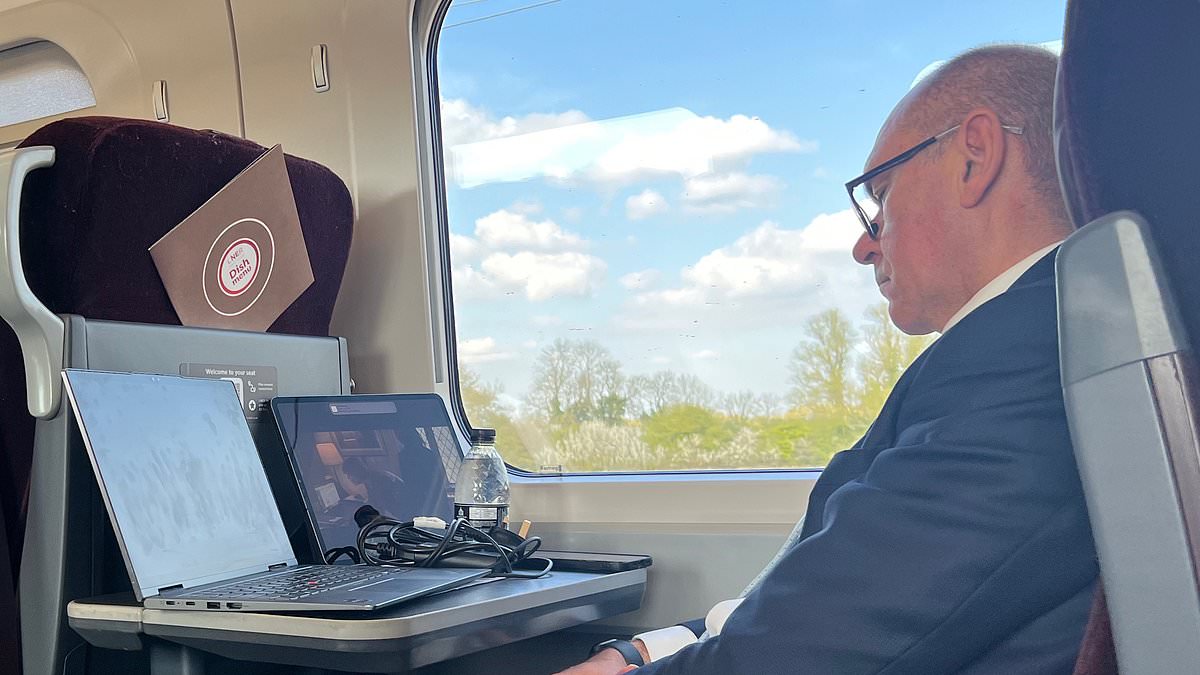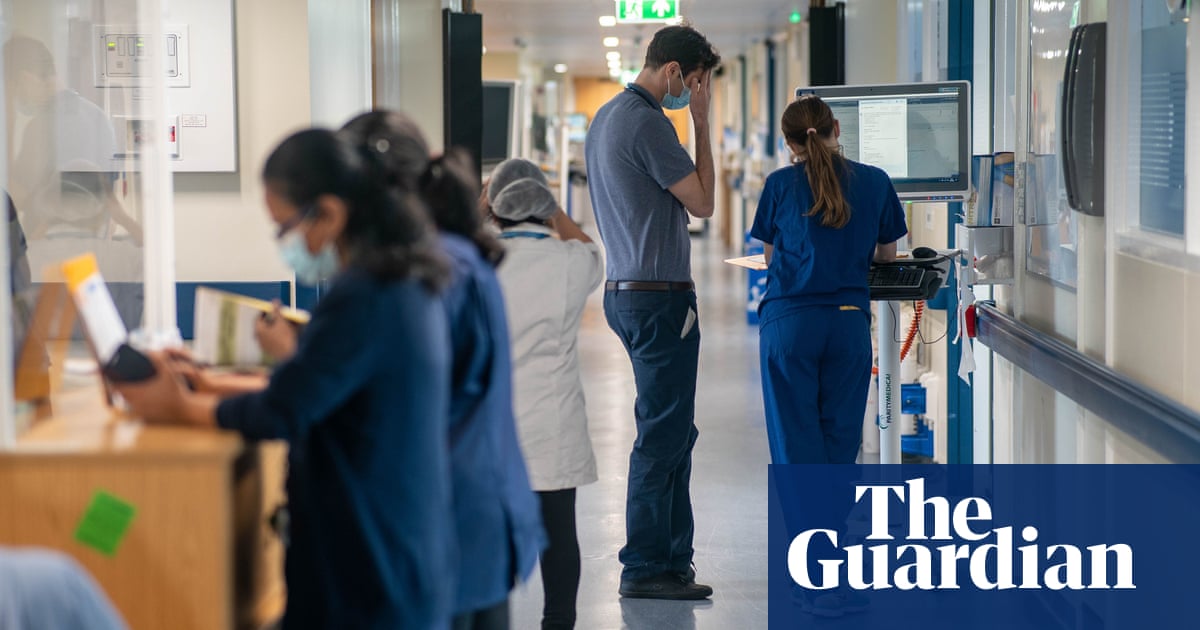Cowper’s Cut 371: Train in vain


It’s not the biggest ‘gotcha’ ever, but it is a gotcha that the Daily Mail published this story about NHS England’s interim chief executive Sir James Mackey falling asleep on the train back to the north-east during the working day, watching Netflix and leaving his laptop open and unattended while going to the toilet, with work-related content on show.
It’s an unfortunate lapse of IT security: this is one of the statutory training courses, and leaving a work laptop unlocked even in the office is seen as a slap-on-the-wrist offence. Clearly, he’s unlikely to do it again - and it is clear from the timing of some of his emails that he is not failing to work well beyond any reasonable core hours.
Sure, this is slightly embarrassing. And it will certainly remind Mr In-Between of why he so clearly hated his last interim national job running NHS Improvement.
What it’s not, however, is particularly important. In a sane world, provided Sir James was demonstrably delivering what the job requires, nobody would greatly care about when or how he delivers the work. If he were to want to have Netflix on in the office for background noise while he churns through emails, and it doesn’t affect his performance, then members of the Reality-Based Community should not care even slightly.
The more prosaic conclusion is that while he is working remotely as much as he currently does, surely it would make greater economic and logistical sense for the powers that be to provide him with a driver and a car with a portable 4G Wi-Fi router and decent space and legroom in the back. Such as the issues here are around information security, that’d solve them well - and with short-notice train ticket prices being what they are, probably save some money.
The Health Select Committee appearance
Sir James’ media mishap followed his appearance with Health But Social Care Secretary Wes Streeting at the Commons Health Select Committee on Tuesday. Correlation is not causation: far be it from me to suggest that the committee has narcoleptic powers.
The day was teed up for this by the NHS Confederation briefing the Guardian that the NHS must - absolutely must - be given more money to cope with the redundancies whose number is as yet unknown. Ahem.
Neither Mr Streeting nor Sir James committed any heinous acts of news during their apperarance. Streeting pronounced thast social care must - absolutely must - stay separate from the NHS; Sir James told a grateful health policy nation that redundancy costs were the subject of talks with our dear, dear friends the Treasury Munchkins.

As if to shake us from our health policy torpor, someone leaked HSJ a good story that senior DHBSC and NHSE officials, who sound very much like Sir James Mackey, think that the yet-to-be-published urgent and emergency care recovery plan is a crock of the brown stuff: one senior source reportedly said DHSC “is frustrated by the lack of ambition … people in the lower echelons certainly regard the current planning as more of the same old thing but that is to be expected, as it is all being formulated by the same old recycled people.”
Another apparently said that the current plan was “full of virtue signalling, rather than meaningful commitments”. And in proposed revisions to the standard contract for 2025-26 out for consultation and spotted by HSJ, NHSE proposes ‘minimum waiting times’ for certain elective specialities as a means of cost control.
Erm, what? Will this lead to demonstrable cost-savings? What will the stood-down staff do instead of the jobs for which they’re trained?

In other utterly surreal news, The Guardian was briefed that “hospitals in England are being offered unlimited bonus payments to remove people they decide do not need treatment from their waiting lists amid warnings that thousands of patients most in need are still facing unacceptable delays … trusts have this week been ordered to “validate” their entire waiting list”. And the previous payment cap of 5% of a trust’s waiting list is being scrapped, meaning that there is no limit to the payments trusts could receive for taking patients off their lists.
I’m sorry: how many hospitals haven’t already validated their waiting lists to within an inch of their lives?
And what the hell was NHS England actually doing all day, if it was not checking up on very basic things like this?
Chris Hopson goes and Sam Jones returns
It’s been a slightly gossipy week: we had the totally unsurprising news that NHSE’s former national director of [coughs] strategy Chris Hopson is on the way out, and the rather less expected reporting by Health Service Journal that Sam Jones is to take over as the Department For Health But Social Care’s new permanent secretary.
Chris was a very adept chief executive of NHS Providers, and during the later part of his tenure there his views were, to put it as mildly as one can put a thing, highly influenced by Sir James Mackey’s views.
Alas, Chris also had a most unfortunate track record while at Providers of going behind the backs and against the advice of his directors of communication to brief favoured journalists. This was how and when I first started to recognise the distinctive traits and phrases of a Hopson leak. I shall miss those plumbing lacunae, but not very much: certainly not as much as the credulous journalists whom he fed.
Sam Jones segued from her career in nursing over to the NHS Management Trainee Scheme: this saw her become a chief executive very young, clocking up two-year terms at West Herts and Epsom and St Helier.
From there, she went on to lead the Vanguards/New Care Models programme for NHS England, which was much-funded but (apart from in its care home projects) short on demonstrable improvements and on scale-ability. Which had very much been its objectives.
Sam then took charge at Operose Health 2019-21, before moving to advisory and then operational jobs for the Boris Johnson 10 Downing Street administration, and on from there to become a non-executive director of DHBSC in 2023.
I like Sam: she’s bright and funny, and has been one of the ‘brains trust’ circle of advisors to Health But Social Care Secretary Wes Streeting (who evidently doesn’t hold her time with The Johnson against her).
How the needs and wants of this new job will fit her skills remains to be seen. DHBSC has been in the numerical and political ascendant over recent years, as NHS England’s star waned and its wings were clipped ever-closer. But the challenge ahead is how to be its permanent secretary during a time when, Borg-like, DHBSC is to absorb legacy-NHSE into ‘The Collective’. (This is ‘Star Trek: The New Generation’ stuff - ask a Millennial, probably.)
Her job as perm sec, therefore, will be to unite DHBSC’s career civil servants with whoever is inherited, or left, from the NHSE into some common endeavour which will lead to the English NHS achieving the Government’s manifesto pledge of RTT back to 18 weeks by the end of this Parliament.
This week saw small further reductions in the RTT backlog, but “in 193,516 cases the patient was waiting more than 52 weeks, in 13,223 cases they were waiting more than 65 weeks, in 1,691 cases they were waiting more than 78 weeks, and in 161 cases they were waiting more than 104 weeks. In 59.2% of cases the patient had been waiting up to 18 weeks, thus not meeting the 92% standard”.
Former DHBSC perm sec and now, implausibly, cabinet secretary Sir Chris Wormald declared that his successor needed “a track record of delivering major productivity improvement and reform, working collaboratively across organisations to deliver cross-cutting government priorities, as well as exceptional strategic capability and judgement” … (and to be) “a confident, inclusive and engaging leader, with a proven commitment to leading others through change” and “a role model of the civil service values of impartiality, honesty, integrity and objectivity”.
Mmmmmmmmm.
The Borg's warning is “we are the Borg. Lower your shields and surrender your ships. We will add your biological and technological distinctiveness to our own. Your culture will adapt to service us. Resistance is futile”.
I wonder whether Wes Streeting is a Star Trek fan.
Recommended and required reading
The Financial Times’ Laura Hughes has this interesting piece about University Hospitals of Leicester, which is apparently the trust with England’s busiest A&E.
Nick Triggle and Laura Donnelly have both been sold the pass on how neighbourhood health systems will save the NHS in England (spoiler: they won’t).
A new report from the Health Services Safety Investigations Body (HSSIB) on people with long-term conditions and how their care is co-ordinated finds that system complexity is undermining attempts at care co-ordination.
The Health Foundation’s new report on electronic patient records concludes that large numbers of frontline staff are unable to use them effectively; a small number of NHS organisations are struggling to use EPRs at all; and “many more aren’t yet using these systems to their full potential”.
Dave West’s latest ‘Integrator’ HSJ column is a good summary of Sir James Mackey as the savour of commissioning (perhaps).
Analysis by HSJ’s Henry Anderson suggests that the underlying gap between annual, recurrent provider income and costs in the NHS in England now exceeds £6 billion.
FT long read on how to restore trust in doctors in an age of misinformation.


